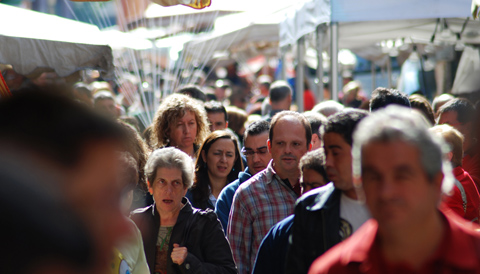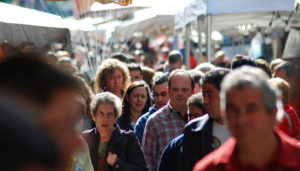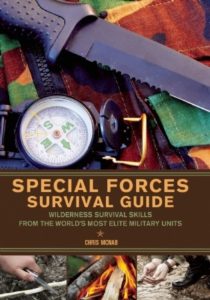

The tragic events during the Boston Marathon on April 15 shocked the world and everyone here at Living Ready. Our thoughts and prayers continue to be with all those affected now and during the long road to recovery.
It highlighted why having a plan in place for what to do if you're in a crowd when disaster strikes is important.
When disaster strikes at crowded event
Living Ready tapped disaster expert Paul Purcell, author of Disaster Prep 101 and someone who helped plan medical responses during a G-8 summit in 2004, to provide insights about what happened in Boston and what to do in crowds during a disaster.
Q: If it's revealed this was a bombing, was the April 15 event a “typical” attack?
A: The primary device is tragic enough, but in many cases there is a secondary device. In this instance it seems as though the primary device was “double-primed,” or in shooting parlance, it was a double-tap.
In many cases there may be a secondary device set up to go off for the purpose of disrupting emergency response. Locations for these types of devices are chosen based on a guess where arriving responders would park and gather for a temporary Command Post.
Q: Should there be concerns about more explosions in Boston?
A: Though there may be a secondary device, there are very few organizations on the planet that have the resources to set numerous working bombs. So, chances are good that, in the case of something as massive as the Boston Marathon, most people there, mathematically speaking, will be safe from other devices.
However, people should keep their eyes open for odd unattended packages, suspicious behavior (i.e. someone skulking about trying to hide identity when others running for safety, etc.).
Q: What should a person do when inside a crowd that panics?
A: When in crowds, the worst thing is a stampede. Try to stay out of the main flow if possible, and be ready to sidestep into alleys, stores, etc. if need be.
Q: What are some things to consider when a city is on lockdown?
A: A city on lockdown is a major pain. Your best asset at this point is patience, and thinking ahead.
First thought: Get some water. Duck into a restaurant or store to get a bottle or two of water before they're bought up by the crowd. Then pick a comfy spot to wait. Eventually, they'll put mass transit to work as much as possible and get people out of the area. It'll take a while, but that's always emergency management's game plan.
Q: Why are cell phone networks sometimes shut down in an emergency like this one?
A: With cell phones, many emergency management agencies will have trunk priority [Living Ready says: Think of trunks like channels] so they shut down civilian calls to allow them plenty of emergency response access.
One thing to try is texting and then multi-media messaging [i.e. sending a picture from your phone to another phone]. Those services use different trunks and you can sometimes get a message out. Also try a long-distance call which uses yet another trunk (which is one reason everyone should have an out-of-town emergency contact person).
The thing to do with multimedia is to take a picture of yourself or a picture of a handwritten note saying you're okay and what you'll do and/or where you'll go.
Q: What should people do if their cell phones stop working?
A: You should ALWAYS have a set of “standing orders” or a set reaction plan that you will follow WHEN all communication goes down. Cell phones are great, but the foundation is standing orders.
Q: Although it doesn't appear the Boston incident was one, are there special considerations if an attack is also biological?
A: One other consideration in bombings in crowds is that it may be a form of a “dirty” bomb, either with radioactive materials, biochem components, poisons (there was a container of cyanide in the truck bomb in WTC '93), or simple irritants. So, in a situation like this, you should protect your breathing as much as possible with even simple methods like covering your mouth with your shirt, tie, or other tightly-woven cloth.
On the next page, don't fall victim to panic.
Events such as the one in Boston underscore why it's important to always be prepared. Disasters don't take a holiday, be it Christmas in Alabama or Patriots Day in Boston. Unfortunately, those holidays are often the targets of terrorists looking to inflict the greatest psychological damage.
Don't Let a Terrorist Damage Your Psychology
“Terror” refers to psychology by definition. True, a terrorist can and will try to hurt people physically. But the real effects are psychological. That's why the targets are usually symbolic. Consider 9/11 and the Twin Towers, the 1996 Olympic bombings in Atlanta, the Murrah Federal Building in 1995 in Oklahoma City, the World Trade Center in 1993 and even the 1920 bombing on Wall Street in New York that killed 40 people.
Unlike physical attacks, would-be victims of psychological terror have a choice: Give in to panic or continue life as normal. Living Ready chose the latter. To do anything else is to allow the terrorist to have power over us.
That meant not posting information we couldn't verify on social media. When we listed a hotline for family members in Boston, we included the source. Not everyone was as cautious, and rumors hit Twitter and Facebook that only increased the potential for panic.
That's not a wise decision – and it was a decision. Unlike those physically injured, no one was forced to give in to fear and panic. Hopefully, Living Ready readers showed restraint and waited for the dust to settle – figuratively and literally.
On the next page, a Living Ready report from Boston on the resilience of the city.
Living Ready Staff Report from Boston
Meghan Shinn is editor of Living Ready sister pub, Horticulture. She's behind much of the food growing content you see at Living Ready. Shinn is from the Boston area, and had the following to say about the resilience of the city:
Marathon Monday always disproves the stereotype of Bostonians as a bit gruff, or a bit snobby. This year, obviously, everyone got to see how helpful, capable and generous Boston folks can be. Yet even in years past, if you came here for the race, you'd find a welcoming spirit and a real camaraderie surrounding race day and its related events.
Marathon Monday is also Patriots Day, which is a Massachusetts holiday, so most schools are closed, government offices are closed, and so on. It's the start of spring vacation week for the public schools.
The city just has a very fun, holiday feel, with tourists and locals alike milling about and enjoying the day, particularly if it's at all warm, like it was yesterday. People who have to work despite the holiday might pop over to the finish line on their lunch hour to cheer a few random runners on. Several times when Horticulture had a larger Boston office a few of us did just that. There's also a Red Sox home game every year, with a special early start.
When I was 9 or 10, my dad took me to see the Sox on Marathon Monday. I can't remember anything about the game. I only recall the spring sunshine, the happy crowds of people and my dad holding my hand as we worked our way back to the T (subway station) after the game. I remember him congratulating some runners, all wrapped up in their free race-day ponchos.
When I think about it now, the memory feels so bittersweet. It seems like it was such a simpler time. I now have two daughters of my own, and I worry when we go out to special events. I worry even more about what the world will be like for them years from now.
What makes me feel better, and gives me some hope, are displays of caring and bravery such as we saw from the first responders and simple bystanders yesterday. I have to hang on to the idea that such spirit will always prevail, and I'm proud that it was so evident in my commonwealth yesterday.


![Best Concealed Carry Guns In 2025 [Field Tested] Wilson Combat EDC X9S 1](https://gundigest.com/wp-content/uploads/Wilson-Combat-EDC-X9S-1-324x160.jpg)


![Best 9mm Carbine: Affordable PCCs [Tested] Ruger Carbine Shooting](https://gundigest.com/wp-content/uploads/Ruger-Carbine-Shooting-100x70.jpg)
![Best AR-15: Top Options Available Today [Field Tested] Harrington and Richardson PSA XM177E2 feature](https://gundigest.com/wp-content/uploads/Harrington-and-Richardson-PSA-XM177E2-feature-100x70.jpg)
